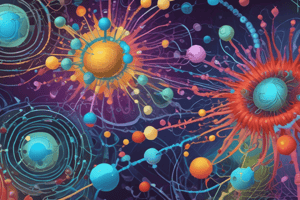Podcast
Questions and Answers
What is the role of enzymes in biochemical reactions?
What is the role of enzymes in biochemical reactions?
- To increase the rate of reactions (correct)
- To reduce the concentration of reactants
- To decrease the rate of reactions
- To create new reactants
How does the absence of a catalyst affect biochemical reactions?
How does the absence of a catalyst affect biochemical reactions?
- It increases the rate of reactions
- It has no effect on the rate of reactions
- It significantly prolongs the time required for reactions (correct)
- It decreases the rate of reactions
What conditions can influence the rate of a chemical reaction?
What conditions can influence the rate of a chemical reaction?
- Light intensity
- Temperature, pressure, and pH (correct)
- Sound frequency
- Magnetic field strength
How does increased temperature affect the rate of chemical reactions?
How does increased temperature affect the rate of chemical reactions?
What is the role of reactant concentration in influencing the rate of a reaction?
What is the role of reactant concentration in influencing the rate of a reaction?
What is the main function of enzymes?
What is the main function of enzymes?
What is the role of cofactors in relation to enzymes?
What is the role of cofactors in relation to enzymes?
How is the enzyme-substrate complex formed?
How is the enzyme-substrate complex formed?
What are active sites on enzymes primarily responsible for?
What are active sites on enzymes primarily responsible for?
Which model describes the active site of enzymes where substrates bind?
Which model describes the active site of enzymes where substrates bind?
Flashcards are hidden until you start studying
Study Notes
- Enzymes are essential for increasing the speed of reactions in living organisms, allowing for the production of necessary biological molecules.
- Enzymes lower the activation energy of reactions, enabling them to occur more efficiently.
- Enzymes do not add to or change the overall energy of a reaction, only affecting the activation energy.
- The main function of enzymes is to catalyze chemical reactions by lowering the activation energy.
- Enzymes require cofactors to help maintain their shape and effectively bind with substrates.
- The enzyme-substrate complex forms when sufficient amounts of enzyme and substrate collide and bind at the active site of the enzyme.
- The enzyme undergoes a conformational change when the substrate binds to its active site, catalyzing the reaction.
- Enzymes are protein structures with a specific three-dimensional shape, possessing an active site for binding substrates.
- Active sites are the open spaces on enzymes where substrates bind, facilitating the conversion of the substrate into the intended product.
- The active site can be described using the induced fit or lock and key model.
- Enzymes, such as lactase, play important roles in the breakdown of various substances in the human body.
- Lactase converts the sugar lactose into glucose and galactose by forming an enzyme-substrate complex and undergoing a conformational change.
Studying That Suits You
Use AI to generate personalized quizzes and flashcards to suit your learning preferences.




